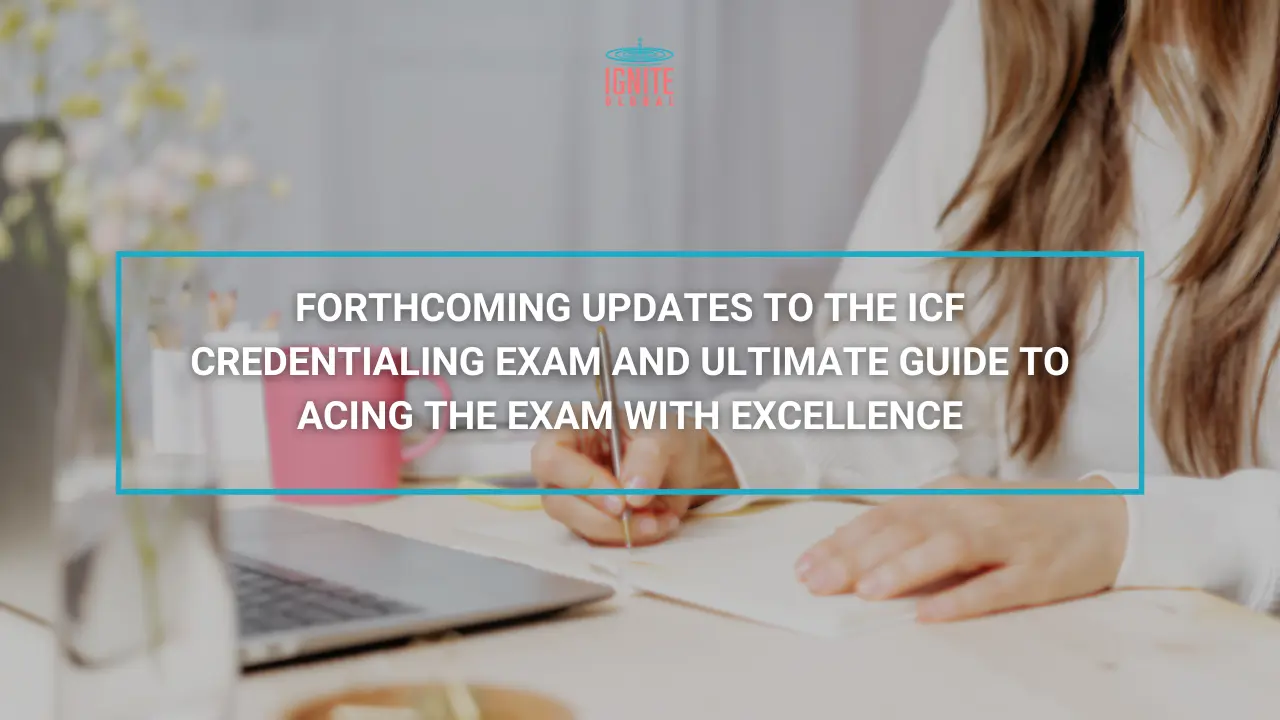Table of Contents
ToggleWhat is the ICF Credentialing Exam?
The ICF Credentialing Exam is an integral part of obtaining an International Coaching Federation (ICF) credential. This exam evaluates a candidate’s understanding and application of the ICF Core Competencies, the ICF Code of Ethics, and the ICF definition of coaching. The exam is designed to ensure that coaches possess the necessary knowledge and skills to provide high-quality coaching services.
The previous exam, known as the Coach Knowledge Assessment (CKA), was phased out at the end of May 2023 and was replaced by the new Credentialing Exam. Unlike its predecessor, the new exam is not just an assessment; the ICF describes it as a “high-quality, state-of-the-art credentialing exam aligned with the highest standards of certification test development practices.”
This new format was crafted with input from ICF-credentialed coaches worldwide who volunteered as subject matter experts. This collaborative effort ensures that the exam remains both relevant and rigorous, accurately reflecting the dynamic and evolving nature of the coaching profession.
Updates: Forthcoming Changes to the ICF Credentialing Exam
August 1, 2024 – The ICF has announced minor adjustments to the Credentialing Exam to enhance its efficiency for candidates. These updates, influenced by candidate feedback and evolving industry standards, are designed to improve the exam experience while upholding the ICF’s rigorous assessment criteria.
The new changes will be implemented starting August 20, 2024. The ICF Credentialing Exam, developed and reviewed by coaching professionals worldwide, is truly an exam by coaches, for coaches.
All candidates, whether pursuing ACC or PCC credentials, currently take the same exam. However, ICF is preparing to introduce a specific ACC Exam, expected to be launched later this year.
What are the ICF Credentialing Exam requirements?
Embarking on the journey to obtain an ICF credential requires a commitment to meet a set of stringent requirements designed to prepare you for the challenges and responsibilities of professional coaching. Here’s a comprehensive overview of the requirements:
Training Hours
To be eligible for the ICF credentialing exam, you must first complete a specified number of training hours, which vary depending on the credential level you are aiming for:
- Associate Certified Coach (ACC): 60 hours of coach-specific training.
- Professional Certified Coach (PCC): 125 hours of coach-specific training.
- Master Certified Coach (MCC): Over 200 hours of coach-specific training.
Mentor Coaching
In addition to these training hours, a coach must also engage in 10 hours of ICF mentor coaching. This requirement includes a mix of group and individual sessions and must be spread over a minimum of three months.
Coaching Experience
After completing your training and mentor coaching, you need to gather your coaching experience. The number of required coaching hours also varies by credential level:
- ACC: 100 hours of coaching experience.
- PCC: 500 hours of coaching experience.
- MCC: 2,500 hours of coaching experience.
Exam Scheduling
After your application is approved, you will receive an invitation to schedule your exam with Pearson VUE. You have 60 days from receiving the invitation to book and take the exam. The ICF Credentialing Exam can be taken at a Pearson VUE testing center or remotely via their OnVUE proctoring service.
For those ready to take this pivotal step in their coaching career, further details on booking an appointment and preparing for the exam day can be found in the ICF’s official guidelines on exam procedures.
What is the ICF Credentialing Exam format?
The ICF Credentialing Exam has been updated to a new format that is both flexible and comprehensive, designed to maintain high standards of exam security and integrity. Here’s an overview of the new format:
Delivery Options: The exam is administered through Pearson VUE, providing candidates with two options:
Testing Centers: Candidates can take the exam at Pearson VUE testing centers.
Remote Proctoring: The exam can also be taken remotely via the OnVUE proctoring service, allowing candidates to complete the exam from the convenience of their home or office.
Exam Structure: The exam consists of 81 scenario-based questions, divided into two sections. Each question presents a realistic coaching scenario with multiple-choice responses. Candidates must select both the best and the worst responses to demonstrate their understanding and decision-making skills in coaching situations.
Time Allocation: Candidates have a total of 180 minutes to complete the exam, distributed as follows:
- Exam Instructions: 3 minutes
- Section 1: 41 items, 87 minutes
- Scheduled Break: 5 minutes
- Section 2: 40 items, 85 minutes
This structure ensures that candidates have ample time to consider each scenario and make well-informed decisions.
Updates: What Changes have been made to the ICF Credentialing Exam format?
The revised ICF Credentialing Exam will introduce several key enhancements:
- Reduced Number of Questions: The exam will now feature 78 scenario-based items, down from the previous 81.
- Extended Break: Candidates will have the option of taking a 10-minute break midway through the exam to rest and recharge.
- Improved Screen Presentation: The exam items will be displayed in a way that makes them easier to read and process.
- Enhanced Accessibility: Translated versions of the exam will present the translated items first, with optional English language aids available to support understanding, enhancing the overall user experience.
- Expanded Score Reports: For those who need to retake the exam, the score reports will provide detailed feedback on performance across different exam domains, offering valuable guidance for further study and preparation.
In addition to these exam format enhancements, the ICF is introducing a new online tutorial for the Credentialing Exam. This tutorial is an interactive simulation of the Pearson VUE testing platform, allowing candidates to familiarize themselves with the platform’s features, practice navigating the exam, and review sample questions at their own pace.
This online tutorial became available on August 20, 2024, at no cost.
ICF Credentialing Exam Content
The ICF Credentialing Exam questions are crafted to assess a coach’s practical application of coaching principles through situational assessment items.
The exam includes 81 scenarios where a coach must identify both the most appropriate and the least appropriate course of action from four given options. Each scenario has one correct best action and one correct worst action, and credit is given solely for selecting these specific responses. Although several options may seem valid, the real challenge is pinpointing the most effective and least effective responses according to ICF standards.
The exam’s content spans four domains that encapsulate the core competencies of a proficient coach. These include:
- Foundation
- Co-Creating the Relationship
- Communicating Effectively
- Cultivating Learning and Growth
The questions are allocated to these domains, with each competency receiving a different percentage of focus. For instance, competencies like “Demonstrating Ethical Practice and Embodying a Coaching Mindset” fall under the Foundation domain, while “Establishes and Maintains Agreements” is part of Co-Creating the Relationship.
Proven Tips to Ace the ICF Credentialing Exam with Excellence
1. In-depth Exploration of Core Competencies
Achieving success hinges on a profound understanding of the updated ICF Core Competencies and the ICF Code of Ethics. Go beyond rote memorization of definitions and strive to grasp the core principles of each competency and how they translate into real-world coaching practices.
To deepen your understanding, compare the statements in the Core Competencies with the PCC Markers. These markers, which detail observed coaching behaviors, can shed light on how the competencies are practically applied, offering valuable insights into effective coaching methods.
2. Change Your Mindset: Be a Coach, Not Just an Exam Candidate
The ICF Credentialing Exam goes beyond merely recalling facts; it tests your ability to apply coaching principles in real-world scenarios. When confronted with an exam question, envision yourself in a coaching session with a client. Consider what actions you would take as a coach, taking into account the core competencies and ethical guidelines.
For each question, to find the BEST possible answer, think about which answer partners with the client the most.
When determining the best response in coaching scenarios, prioritize a client-centered approach that focuses on their perspective rather than imposing your own opinions. Encourage and validate the client’s input, empowering them to make decisions and maintain control over their journey. Ensure your actions are transparent and responsive, adapting to the client’s needs and being open and honest in your communication.
To find the WORST answer, think about which answer is most coach-focused (as opposed to client-focused) and misaligned with the Core Competencies.
The WORST response typically involves the coach making decisions for the client, passing judgment, failing to acknowledge the client’s contributions, leading or forcing the coaching process, or disregarding the client’s needs.
3. Master Time Management
This is a timed exam, so employing a strategic approach is essential. Begin by quickly skimming through the entire test to understand its scope. Focus first on the questions you feel most confident about, ensuring you have enough time to provide thorough answers. Use the “flag for review” feature for questions that seem tricky, and plan to revisit them later. This approach helps manage time efficiently and ensures that you maximize your performance across all sections of the exam.
4. Practice and Mock Exams
Using mock exams is a highly effective strategy for preparing for the ICF credentialing exam. These practice tests allow you to pinpoint your strengths and identify areas needing improvement. While the new exam format has limited the availability of practice exams, sample questions are still accessible on the ICF website. These samples provide insights into the exam’s structure and help assess your level of preparedness.
Various resources offer practice tests that closely replicate the actual exam format. Utilizing these resources can be highly beneficial as they help you become familiar with the question styles, timing, and overall structure of the exam, thereby increasing your confidence.
For instance, you can take advantage of Ignite Global’s free mock exam. Integrating these practice tests into your study routine will bolster your confidence and enhance your time management skills. To best simulate exam conditions, take these practice tests under timed settings to acclimate yourself to the exam environment.
5. Focus on Scenario-Based Learning
Engaging in scenario-based learning is an essential strategy for passing the ICF Credentialing Exam. This approach requires applying the ICF Core Competencies and ethical standards to real-life coaching scenarios. By doing so, you enhance your ability to navigate complex coaching situations effectively. Working with realistic scenarios allows you to contextualize theoretical knowledge, making it easier to recall and apply during the exam.
To further benefit from scenario-based learning, consider incorporating role-playing exercises with peers or mentors. These exercises enable you to simulate various coaching situations and practice responding in real time. Not only does this help you apply the competencies and ethics you’ve studied, but it also provides immediate feedback on your performance. Through role-playing, you can identify areas for improvement, refine your coaching techniques, and build the confidence necessary to excel in the actual exam.
If you need additional support in preparing for your ICF Credentialing Exam and wish to join a peer coaching group, consider participating in the Ignite Credential Accelerator Program. This program offers the resources and community support you need to succeed.
6. Seek Support and Resources
Collaborating with a certified mentor coach who has experience in preparing candidates for the ICF credentialing exam can be incredibly beneficial. Such mentors offer personalized guidance, address your specific questions, and conduct mock coaching sessions that mirror the exam format. This tailored support can greatly enhance your understanding and readiness for the exam.
If you haven’t yet enrolled in an ICF Coach Mentoring program, it’s advisable to choose one that includes comprehensive test preparation. For example, Ignite Global offers mentoring packages that include credentialing exam preparation with a practice test featuring 81 questions. Utilizing these resources can help ensure you feel confident and well-prepared on exam day.
7. Exam Day Preparation
On the day of your exam, it’s essential to allocate a 30-minute preparation period. This time is crucial for completing system checks, performing environmental scans, and verifying your ID to ensure compliance with exam protocols. To facilitate a smooth experience with the proctoring process, select a quiet, private space and maintain silence throughout the exam duration. This preparation period helps prevent technical issues and ensures you are ready to focus fully on the exam.
Preparing for and passing the ICF Credentialing Exam is a significant achievement that validates your skills and knowledge as a professional coach. By thoroughly understanding the ICF Core Competencies and Code of Ethics, adopting a coach’s mindset, and mastering time management, you can approach the exam with confidence. Utilizing mock exams and scenario-based learning, seeking support from certified mentor coaches, and adequately preparing on exam day are all critical strategies for success.
By following these comprehensive guides and dedicating yourself to the preparation process, you will be well on your way to achieving your ICF credential and advancing your coaching career. Good luck on your journey to becoming an ICF-credentialed coach!













Excellent article! What every coach preparing for the exam needs to feel comfortable and prepares. going into the exam. Thanks Lux! T
Thank you for your thoughtful feedback, Benita. I’m glad the article provides the clarity and support coaches need as they prepare for the credentialing exam. Your recognition is highly valued and greatly appreciated.